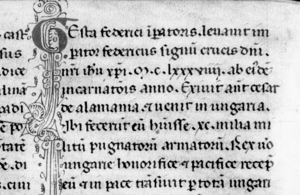Deeds of the Emperor Frederick on the Holy Expedition facts for kids
The Deeds of the Emperor Frederick on the Holy Expedition is a short, old book written in Latin a long time ago. It tells the story of Frederick Barbarossa's journey during the Third Crusade between 1189 and 1190. We don't know who wrote it, but it was probably written in Italy in the 1190s.
Contents
What is the Deeds About?
The Deeds of the Emperor Frederick is a historical account. It focuses on Emperor Frederick Barbarossa's part in the Third Crusade. This crusade was a big military journey to the Middle East. Frederick Barbarossa was a very powerful ruler in Europe. He led a large army on this expedition.
Where Did This Book Come From?
This old book wasn't very well known. Only two copies, called manuscripts, still exist today. One of these copies is in a library in Paris, France. It takes up eight columns of writing across three large pages, called folios.
In both copies, the Deeds is found with another longer book. This other book is called the Narration of the Oppression and Subjection of Lombardy. It tells about a war Frederick had with a group called the Lombard League. This war ended with the Battle of Legnano in 1176. Some historians think the same person might have written both books. Later writers in Italy used parts of these two books in their own works.
What Makes the Deeds Interesting?
The Deeds doesn't share many new facts that aren't in other, longer books about the crusade. However, it can sometimes help us understand things better. It might even clear up small differences between other historical accounts.
For example, modern historians believe Frederick's army had about 15,000 soldiers. But the Deeds says the army had "90,000 armed warriors"! That's a huge difference.
Another interesting part is how the army found its way through the Taurus Mountains. Other books say a Turkish prisoner was forced to guide them. But the Deeds tells a different story. It says the Turk was an important leader, an emir, who offered to help. He knew that if he lied, the emperor could have him executed. This shows a different side to the story.
Images for kids



